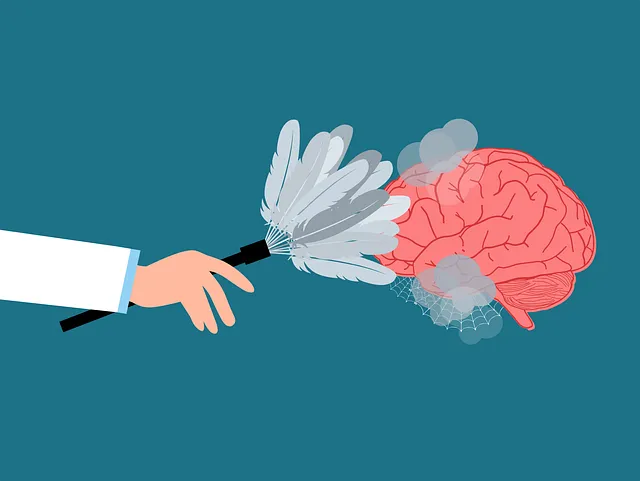In today's diverse society, cultural competency is vital for high-quality mental healthcare, as evidenced by Kaiser Permanente's initiatives in Arvada. Training equips providers with tools to offer personalized, inclusive care, addressing language barriers and diverse faith practices. Their programs, like phone-based mental health appointments, focus on strengthening self-esteem and Mind Over Matter principles through cultural sensitivity, leading to improved patient outcomes and community resilience. Effective communication strategies ensure respectful care for all populations, enhancing patient satisfaction and aligning with risk management goals for mental health professionals.
Cultural competency training is an essential aspect of modern healthcare, ensuring providers can deliver quality care to diverse patient populations. This article explores the critical need for such training, highlighting successful initiatives like Kaiser Permanente’s approach to mental health support. We delve into the positive impact of cultural sensitivity on provider-patient relationships and present effective communication strategies for engaging diverse communities. Furthermore, we showcase real-world applications through Arvada community engagement, demonstrating how these practices enhance healthcare delivery. Contact Kaiser Permanente’s mental health department via their dedicated phone line for more information.
- Understanding Cultural Competency in Healthcare: A Necessity for Modern Practice
- Kaiser Permanente's Approach to Mental Health Training and Support
- The Impact of Cultural Sensitivity on Patient-Provider Relationships
- Effective Communication Strategies for Diverse Populations
- Real-World Applications: Enhancing Care through Arvada Community Engagement
Understanding Cultural Competency in Healthcare: A Necessity for Modern Practice

In today’s diverse society, cultural competency within healthcare has become an indispensable aspect of modern medical practice. It involves understanding and appreciating the cultural differences that shape individuals’ health beliefs, behaviors, and communication preferences. This is particularly crucial when considering the complex landscape of mental health care. For instance, a patient seeking support from a Kaiser Permanente mental health appointment phone number Arvada might have distinct cultural expectations and requirements.
Training in cultural competency equips healthcare providers with the skills to offer personalized, inclusive care. It involves recognizing and addressing potential barriers, such as language differences or diverse faith-based practices, that may impact treatment adherence. By integrating this training into programs like Risk Management Planning for Mental Health Professionals and Inner Strength Development, mental health education becomes more comprehensive. This approach ensures professionals are equipped not just in treating symptoms but also in fostering meaningful connections with patients from various backgrounds, ultimately enhancing the quality of care provided.
Kaiser Permanente's Approach to Mental Health Training and Support

Kaiser Permanente, a leading healthcare provider, takes a comprehensive approach to mental health support and training. They recognize that addressing mental well-being is an integral part of overall healthcare, especially in diverse communities. Their strategy involves educating staff on the latest mental health education programs design, empowering them to provide culturally sensitive care.
One notable initiative is their focus on strengthening self-esteem and promoting mind over matter principles through individual appointments and group sessions. The Arvada location offers specialized mental health clinics, accessible via phone, where trained professionals guide patients towards improved coping mechanisms and enhanced quality of life. This holistic training ensures that Kaiser Permanente’s care aligns with the unique cultural needs and backgrounds of their patient population.
The Impact of Cultural Sensitivity on Patient-Provider Relationships

Cultural sensitivity is a cornerstone of effective patient-provider relationships, especially in diverse communities like Arvada where a wide array of cultural backgrounds and beliefs coexist. When healthcare providers demonstrate an understanding and appreciation for patients’ unique cultural contexts, it fosters trust and openness. This, in turn, encourages patients to share their health history honestly and participate actively in their care plans, leading to improved treatment outcomes.
For instance, consider the impact on mental health appointments at Kaiser Permanente Arvada. A therapist who integrates cultural competency training can create a safer space for clients from various ethnic and social backgrounds. This might involve tailoring therapy sessions to address specific cultural norms, values, and concerns, ensuring that mental wellness coaching programs are accessible and beneficial to all. Such an approach not only enhances patient satisfaction but also contributes to the overall resilience-building within the community, aligning with essential risk management planning for mental health professionals.
Effective Communication Strategies for Diverse Populations

In healthcare, effective communication is key when interacting with diverse populations. With a growing need to cater to various cultural backgrounds and mental health considerations, such as those seeking Kaiser Permanente mental health appointments in Arvada, training in cultural competency becomes essential. This involves learning tailored communication strategies that transcend language barriers and respect individual values and beliefs. For instance, crisis intervention guidance can be adapted to suit different cultural contexts, ensuring sensitive handling of critical situations.
Social skills training plays a pivotal role here, equipping healthcare providers with the ability to connect with patients from diverse communities. Mental wellness coaching programs development, specifically designed for cultural competency, can enhance these interactions. By embracing such initiatives, healthcare organizations like Kaiser Permanente contribute to improving patient care and outcomes in a rapidly changing demographic landscape.
Real-World Applications: Enhancing Care through Arvada Community Engagement

In real-world applications, healthcare provider cultural competency training has proven to enhance care delivery, particularly in diverse communities like Arvada. By engaging with the local community through initiatives such as Kaiser Permanente’s Community Outreach Program Implementation, healthcare professionals gain a deeper understanding of the unique cultural and social contexts that influence health outcomes. This engagement fosters an environment where Mind Over Matter Principles can be effectively integrated into mental health services. For instance, in Arvada, coping skills development programs have been successfully tailored to address specific community needs, making mental health appointments more accessible and impactful via phone or in-person. These efforts not only improve individual well-being but also strengthen the overall resilience of the community.
Healthcare provider cultural competency training is no longer a nice-to-have, but a necessity for modern practice. As demonstrated by Kaiser Permanente’s innovative approach to mental health training and support, and the real-world applications seen in Arvada community engagement, investing in diverse communication strategies enhances patient-provider relationships and ultimately improves care outcomes. By prioritizing cultural sensitivity, healthcare providers can create more inclusive environments, better serving a wide range of patients. For those seeking resources, the Kaiser Permanente mental health appointment phone number in Arvada serves as a useful starting point for connecting with culturally competent care.






